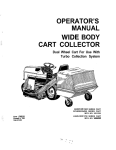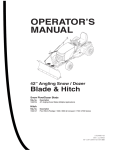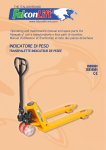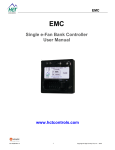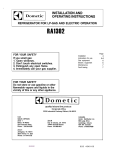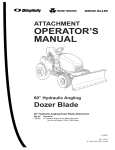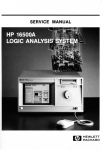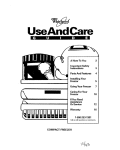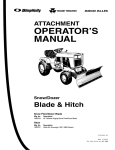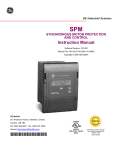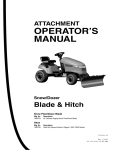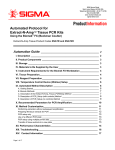Download Simplicity Snow Plow/Dozer Blade Lawn Mower User Manual
Transcript
OPERATOR’S MANUAL 42” Snow Plow/Dozer Blade (42” Blade), Mfg. NO. 1691520 (Hitch Assembly), Mfg. NO. 1692240 i STANDARD FASTENER IDENTIFICATION CHART HEX CAPSCREW CARRIAGE Hardware sizes given in the illustrations throughout this manual. If a washer or nut is identified as “washer, l/2” or “nut, i/2”, this means the inside diameter is l/2 inch BOLT Q .~,@--: PLAIN WASHER LOCKWASHER @ NUT If a screw is identified as “screw, i/2 x 2”, this means the shaft diameter is l/2 inch and the shaft of the screw is 2 inches long. If a screw is identified as “screw, l/2 - 16 x 2”, the number “16” means that the screw has 16 threads per inch. SAMPLE: SCREW IDENTIFICATION HEX CAPSCREW IDENTIFICATION Shown below are actual size heads for standard screw sizes. Example: a l/4 screw has 7/16 head and thus requires a 7/16 wrench. To measure length, use the scale below. 00000 314” Head screw with l/9” S.D. 5/r?” Head screw with 7116’S.D. 9/l 6” Head screw with 318” S.D. I/2” Head screw with 5116” SD. 7/l 6” Head screw with t/4” S.D. Shaft Diameter SAMPLE: NUT IDENTIFICATION WASHER AND NUT IDENTIFICATION Place the washer or nut on the above scale to determine the inside diameter. The actual inside diameter can vary 1116 inch. Use the scale for comparison. Inside Diameter 32 Nut. l/2 Inside Diameter Table of Contents Inside Front Cover STANDARD FASTENER IDENTIFICATION CHART ...................................................... SAFETY RULES General ..................................................................................................................................................... 2 Preparation ............................................................................................................................................... 2 Operation .................................................................................................................................................. 2 PARTS ILLUSTRATION .............................................................................................................................. 3 ASSEMBLY. ................................................................................................................................................. 4 INSTALLATION.. .......................................................................................................................................... 5 REMOVAL .................................................................................................................................................... 8 OPERATION AND NORMAL CARE Transporting .............................................................................................................................................. 8 Operation On Slopes ................................................................................................................................ 8 Dozing and Snow Plowing ........................................................................................................................ 8 Normal Care .............................................................................................................................................. 9 ADJUSTMENTS Skid Shoes ..___..._.._..,,............................................................................................................................ Blade Angle ,.._.__,,,._....,_........................................................................................................................... Spring Tension __...._...,,_.___.._.................................................................................................................... TORQUE SPECIFICATIONS CH+F _.............................................................................. .~ ‘: . 10 10 10 Inside Rear Cover Accessories For best performance, it is recommended to use tire chains and two (2) rear wheel weights. A rearmounted weight box can also be added for addiiional traction. The maximum weight added to the tractor should not exceed 35 Ibs./wheel plus 100 additional pounds in the rear weight box. A Snow Cab is available to protect operator from winter weather. 1 safety Rules Read these safety rules and follow them closely. Failure to obey these rules could result in loss of control of vehicle, severe personal injury to yourself or bystanders, or damage to property or equipment. The in the text signifies important cautions or warnings which must be followed. ALL WARNING, CAUTION, and instructional messages on this attachment and on your tractor should be carefully read and obeyed. Personal bodily injury can result when these instruc- GENERAL *Read the operators manual carefully. Be thoroughly familiar with the controls and proper use of the equipment. Know how to stop the unit and disengage the controls quickly. *Do not run the engine indoors. Exhaust fumes are dangerous. *Never allow children to operate the machine. Do not allow adults to operate it without proper instruction. *Wear proper footwear. Do not operate tractor when barefoot or when wearing open sandals or canvas shoes. *Shift into neutral before attempting to start the engine. *Keep the area of operation clear of all persons, particularly small children and pets. OPERATION *Do not carry passengers. l *Make sure: a. tractor and attachments are in good operating condition. l b. all safety devices and shields are in place c. and in good working condition, and Do not allow anyone to use the snow plow/dozer blade unless they have been instructed on how to operate it safely. Never attempt to adjust, repair or service the snow plow/dozer blade while the tractor engine is running. *Do not allow others near the snow/dozer blade while it is being used. d. all adjustments (skid shoe height, etc.) have been made. *Use the snow plow/dozer blade only in daylight, or good artificial light. a. Use approved gasoline container. *Always lower the snow plow/dozer blade completely to the ground when leaving it unattended to prevent it from being accidentally lowered and causing injury. Make sure blade is locked in “DOWN” position due to spring-assist. b. Never remove the cap of the fuel tank or add gasoline to a running or hot engine, or fill the fuel tank indoors. Wipe up spilled gasoline. *Always operate the tractor at reasonable speeds to prevent the blade from catching an object and stopping the tractor abruptly. PREPARATION *Handle gasoline with care-it is highly flammable. 2 42” Snow Plow/Dozer Blade PARTS ILLUSTRATION / _ .ySpring location fir garden tractors ,(see chart on page 6). Spring location for lawn tractors (see chart on page 6). gurei. Rd. NO. A B C D E F G H I J K L M N Qtv. 1 1 1 2 1 2 4 1 1 1 4 4 2 2 Description Ref. NO. QW. Description BAR ASSY., Push SPRING 0 P 1 1 SPRING CHAIN, 4-Link CAPSCREW, 5/16-18x l-114 WASHER, Flat, 5116 LOCKNUT. Hex. 5116-18 I GUIDE ASSY., Rod Q 1 SETSCREW, 5/1&18x 112 ROD. Lift R S 2 1 COLLR. Set SPRING, Clip PIN, Pivot T U 1 1 PIN, King BRACKET ASSY. v W X 1 1 1 PIN CLIP, Pin Y z 1 1 AA 1 CAPSCREW. 3/8-16x 2-114 LOCKNUT, 318-16 3 B L A D E TRIP ASSY., Spring EYEBOLT SHOES, Skid (Assembled) PLATE, Wear (Assembled) STOP, Bar SCREW, Taptite FRAME, Pivot 42” Snow Plow/Dozer Blade ASSEMBLY 1. Place the blade on a flat surface. 2. install two bar stops (A, figure 2) using the two 5/l 6-l 8 x 1” taptite’screws (B). Figure 2. Bar Stop A. Bar Stop B. Taptite Screw, 5/l 6-l 8 x 1 3: Insert eyebolt (A, figure 3) thru.iug on blade and screw on 5/16 nut (B) only far enough so that it is flush with the end of the eyebolt. 4. Hook the spring (C) into the pivot frame (D). Stretch the spring with a pliers to hook springs on eyebok (A). 5. Repeat steps 3 and 4 for the other spring 6.Tighten the nut (B) on both eyebolts down to expose about 3/4” (19 mm) of thread. ?.Add the other nut (E) to each eyebolt. Hold the first nut (B) secure with a wrench and tighten the second nut (E) securely on each eyebok. Figure 3. Tension Springs A. Eyebolt 0. Nut, 5116 C. Spring D. Pivot Frame E. Nut, 5/16 42” Snow Plow/Dozer Blade 8. Assemble the chain (A, figure 4) to the tractor as follows: a. On left-hand side, remove the upper self-tapping screw that holds bumper to frame. This is the hole used for installing chain in the following steps, using one 5/16-18x l-114 capscrew (B), two 5/16 washers (D), and one 5/16 locknut. b. Place one 5/16 washer onto the screw. Then place the chain on the capscrew, and then the other 5/16 washer. c. Insert the capscrew (B, figure 4) as shown. From inside frame, install 5/16 locknut onto capscrew. Tighten snug only at this time. The spring (C) will be installed in “Installation” section (step 6), and hardware will be tightened. I Figure 4. Chain A. Chain B. Capscrew C. Spring D. Flat Washer INSTALLATION 1. Drive the tractor over the push bar until rear of push bar is under front hitch. P.Stop engine, remove key and set parking brake. 3.Attach the bracket (J, figure 5) to the two rear holes in the tractor hitch with the four pins (F) and safety clips (G) provided. Insert the pins from the outside. Make sure the push bar mounting holes (in the bracket) are toward the front. 4.Attach the push bar to the bracket, using the two 3/8-16x 2-l/4 capscrew (H) and 3/8 locknuts (I) provided. gure 5. Hitch and Lift Rod Lift Rod G. Safety Clip Front Set Collar H. Capscrew. 3/8-16x Spring Clip 2-;I4 Spring I. Locknut, 3/S-16 Rear Set Collar J. Bracket Pin K. Push Bar 42” Snow Plow/Dozer Blade 5. Raise the push bar and hook up the spring (A, figure 6) in location B or C as follows: Location I Tractor (Series) B 4000,5000,500,600, 12LT. 12RT. Resent C 6000,800, 16GTH, 17GTH I I 6. Lower the push bar and tighten the capscrew and nut which hold chain to tractor frame. gure 6. Lift-Assist Spring Spring Spring Location-Lawn Tractors (See Chart) Spring Location - Garden Tractors (See Chart) 42” Snow Plow/Dozer Blade 7. Insert front of push bar (A, figure 7) into pivot frame on rear of blade. Then install king pin (C) down thru holes in hitch and pivot frame. Secure king pin (C) with spring clip (D). 8. Using king pin as the pivot, swivel push bar to align holes for pivot pin (E). Then install pivot pin downward thru holes in blade and push bar. The pivot pin can be installed in any of three holes, depending on desired blade angle. I Figure 7. Dozer Blade Assembled and Installed A. Push Bar D. Spring Clip B. Pivot Frame E. Pivot Pin C. King Pin 3 :., j.. : 9,Assemble lift rod as shown in figure 8. (The exploded view illustration is shown in figure 1.) Insert tip of rod guide (A, figure 8) thru hole in lift arm (B) of push bar. Trap the rod guide on each side of lift arm with spring clips (C and D). 10. Connect rear of lift rod to lift lever mounted on tractor using the spring clip. il. Perform adjustments, see page 9. Figure 8. A. Rod Guide B. Lift Arm (Push Bar) C. Outer Spring Clip D. Inner Spring Clip 7 42” Snow Plow/Dozer Blade REMOVAL 1. Lower the blade, 2. Remove blade and lii rod from push bar. 3. Raise push bar and unhook the spring (A, figure 6) from the chain. 4. Disconnect the lift rod from the lift lever on tractor by removing the spring clip. 5. Remove the bracket (J, figure 5) from the tractor hitch by removing four pins and safety clips. 6. Reinstall all pins (king pin, pivot pin, clevis pins) and secure with spring or safety clip for storage. OPERATION AND NORMAL CARE Transporting Dozing and Snow Plowing For maximum ground clearance, transport the blade to and from work areas fully raised and angled straight ahead. When dozing, push the dirt to the desired location, then drag the blade backwards for final leveling. Pack down the dirt or gravel by driving the tractor over the leveled area. A Use any grade to your advantage. Plow downhill and set the blade angle so that plowed material (especially snow) is moving downhill as it leaves the blade. For large drifts of snow, bite off small amounts instead of plowing a full blade width. WARNING Be particularly careful and operate at low tractor speeds in any area where the blade can hook on solid objects. Such objects can cause the tractor to be jarred or come to an abrupt stop. Always use full engine throttle and use the ground speed control lever to control ground speed and obtain the needed power to move the material. Operate at a safe speed, depending on conditions, so that you have complete control of the tractor. Rear wheel weights and chains are recommended for slippery surfaces. Operation On Slopes Never operate on slopes greater than 30 percent (16.7”) which is a rise of 3’ (91 cm) in lo’ (305 cm) forward. Use two rear wheel weights (one per wheel) when operating on slopes greater than 20 percent (11.3”). Always operate up and down the face of slopes, and never across the face. Use a slow ground speed on slopes. 8 42” Snow Plow/Dozer Blade Normal Care After dozing jobs, hose down the blade to remove excess dirt. Coat bare metal surfaces to prevent rusting. Lightly oil all pivot points. If the wear plate (A, figure 9) on the bottom of the 42” blade is worn excessively, replace it wrth a new one by removing the six carriage bolts (B), lo&washers (C) and nuts (D). igure 9. ,. Wear Plate . Carriage Bolt, 3/9-16 x 1 Lockwasher Nut ADJUSTMENTS Lift Rod For initial setting, place front set collar (A, figure 10) 1” from rod guide with blade fully lowered. Place rear set collar (B) against spring (C). Tighten the setscrews in the two set collars. To adjust, perform the following: 1. Fully raise the blade by raising on the tractor lift lever. Measure distance between scraper bar and ground. If it measures approximately 6”, it is prop erly adjusted. If not, proceed to step 2. 2. Lower the blade. Loosen the setscrew in the front set collar. Move the set collar back to increase clearance or forward to decrease clearance. Tighten the setscrew. Recheck the measurement. Figure 10. A. Front Set Collar B. Rear Set Collar C. Spring M O T E : D%rent ground contours may require different adjustments. Lower the blade to adjust rear set collar. Moving the rear set collar toward rear will allow the blade to follow a rolling contour. The farther back the rear set collar is positioned, the more the blade will float. Moving the rear set collar toward the front will increase blade down pressure. 9 42” Snow Plow/Dozer Blade Skid Shoes Alternate holes are provided to permit adjustment of the shoe assemblies for raising and lowering the blade to various working heights (see figure 11). When cleaning snow from gravel or earth drives or walks the shoe assemblies should be lowered fully to prevent blade contact with gravel or ground. When cleaning smooth hard surfaces, like concrete, the shoe assemblies are normally placed fully up to allow the blade to scrape the surface. To adjust the skid, raise the block with a piece of wood. figure 11) and move the skid desired height. Tighten the blade off the ground and Loosen the capscrews (A, shoes (6) up or down to capscrews securely. Figure 11. Skid Shoes A. Capscrews, 3/S-18 x 314 B. Skid Shoes Blade Angle To adjust the angle of the blade, proceed as follows: 1. Lift the blade off the ground using the tractor lift lever. 2. Remove the pivot pin (H, figure 1 and E, figure i), move the blade to desired angle and reinstall the pivot pin in a diierent hole. Spring Tension This snow plow/dozer blade is spring loaded so that when the blade strikes a solid object, the springs will allow the blade to release as shown in figure 12 rather than cause damage. The blade will go back to original position after object is cleared. To adjust spring tension, hold rear nut (A, figure 12) and loosen front nut (B). Tighten rear nut (B) to increase spring tension or loosen nut to decrease spring tension. Tighten front nut (8) so the two nuts are drawn firmly together. I Figure 12. Spring Tension A. Adjustment Nut (Rear) B. Jam Nut (Front) 10 42” Snow Plow/Dozer Blade NOTES 11 42” Snow Plow/Dozer Blade NOTES 12 TORQUE SPECIFICATIONS FOR STANDARD MACHINE HARDWARE TOLERANCE 4096 SEE SAE GRADE R 0 h/Lb. FtJLbs. a-32 8-38 lo-24 lo-32 w-20 114-28 S/18-18 5118-24 318-18 318-24 7118-14 7118-20 l/2-13 l/2-20 9118-12 9118-18 5/a-ii 518-18 314-10 314-18 7/a-9 7/8-14 l-a 1-12 19 20 27 31 88 78 -7T 12 20 2 35 50 55 85 75 90 loo 180 180 140 155 220 240 SAEGRADE#5 SAEGRADEII) Q N m . 2.1 2.3 3.1 3.5 7.8 8.8 15. 18.3 27.2 31.3 40.8 47.8 as. 74.8 88.4 102. 122.4 138. 217.8 244.8 190.4 210.8 299.2 328.4 In./Lbs. FtJLbs. 30 31 43 49 8 10 17 19 30 35 50 55 75 90 110 120 150 180 280 300 400 440 580 840 NOTE: 1. These torque values are to be used for all hardware excluding: locknuts, self-tapping screws, thread forming screws, sheet metal screws and socket head setscrews. 2. Recomended seating torque values for locknuts: a. For prevailing torque locknuts. use 65% of grade 5 torques. b. Forflange whizlock nuts (and screws) - use 135% of grade 5 torques. 3. Unless otherwise noted on assembly drawings all torque values must meet this specification. Q InJLbs. FtJLbs. Nm. 3.4 3.5 4.9 5.5 10.9 13.8 23.1 25.8 40.8 47.8 68. 74.8 102. 122.4 149.8 183.2 204. 244.8 353.8 408. 544. 598.4 788.8 870.4 41 43 80 aa 12 14 25 25 45 50 70 80 110 120 150 170 220 240 388 420 800 aa0 900 1,000 Nm. 4.8 4.9 8.8 7.7 18.3 19. 34. 34. 81.2 68. 95.2 108.8 149.8 183.2 204. 231.2 299.2 328.4 525. 571.2 818. 897.8 1,224. 1,380. BOLT HEAD MARKING S.A.E. GRADE: SIMPLICITY MANUFACTURING, 500 N. Spring Street Port Washington, Wi 53074 INC. FORM 1709932 PRINTED IN U.S.A. 3/94-IPS
















